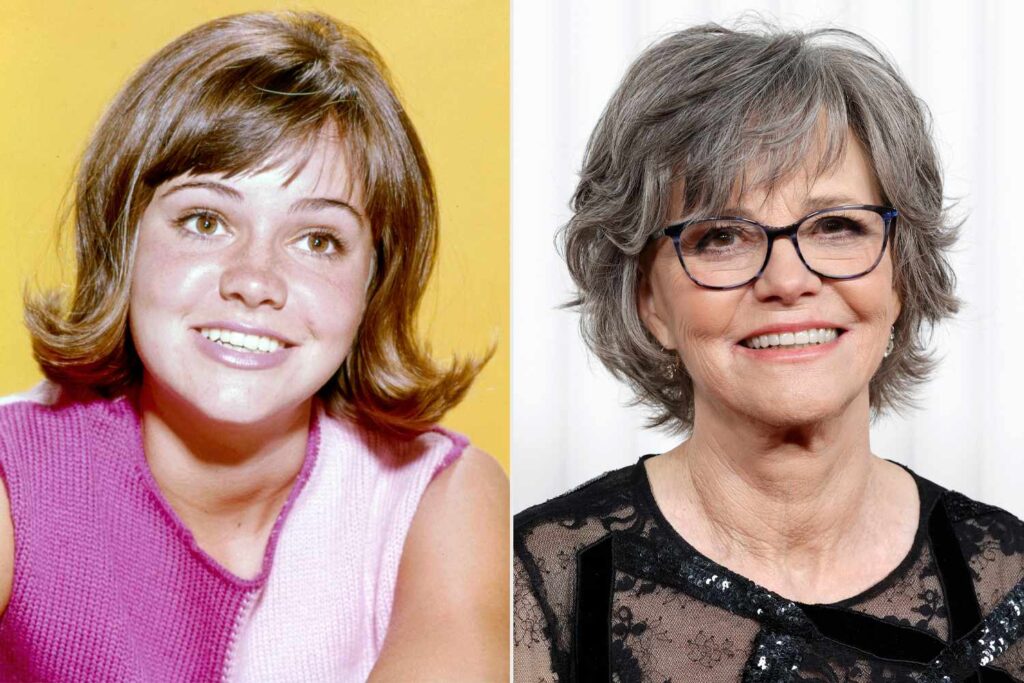
Interesting Life of Actress Sally Field
On a crisp November evening in 2012, Sally Field was promoting Steven Spielberg’s “Lincoln” in New York City. After an exhausting day of interviews and press events, she stepped outside the venue to find a crowd of fans huddled together in the cold, hoping for a glimpse of her.
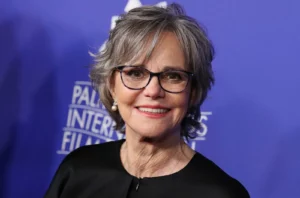
Instead of rushing to her car or giving a quick wave, Sally paused, scanning the faces in the crowd. She then approached them, smiling warmly, and began interacting with each individual as though they were old friends. She signed posters, posed for photos, and listened intently to their stories. One young woman, visibly nervous, shared her struggles with self-confidence and a fear of pursuing her dreams. Sally knelt to her level, placed a reassuring hand on her shoulder, and said, “You don’t need to be fearless; you just need to be brave enough to try.” The moment left those present not just starstruck but genuinely moved by her compassion and sincerity.
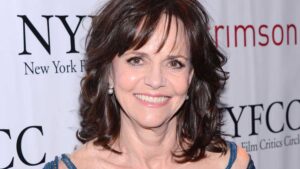
Sally Field’s ability to connect deeply with others isn’t limited to fans—it’s a thread that runs through her career and life. Her dedication to her craft has produced some of the most memorable performances in film history, marked by an intense commitment to authenticity. For “Norma Rae” (1979), her role as a single mother turned labor activist, she didn’t just study the character on paper. She visited textile mills, spent hours with real workers, and absorbed their stories of exploitation and resilience. The iconic scene where Norma Rae stands on a table holding a handwritten “UNION” sign was not just powerful because of the writing or direction it was Sally’s conviction, built on weeks of preparation, that made it unforgettable. The sweat on her brow, the defiance in her eyes, and the trembling determination in her voice were all real. The scene electrified audiences and became a cultural symbol of empowerment, cementing her as a performer who could bring both heart and ferocity to the screen.
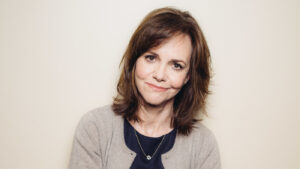
Her role as Mary Todd Lincoln in “Lincoln” (2012) showcased a similar dedication. Sally lobbied intensely for the role, knowing it would be a challenge to portray such a complex and often misunderstood historical figure. Once cast, she delved into Mary Todd Lincoln’s life, studying her letters and the accounts of historians to capture the nuances of her intellect, grief, and mental health struggles. Field even insisted on being treated as Mary Todd on set, staying in character between takes to maintain the emotional depth required for the performance. One particularly grueling scene, where Mary confronts Abraham Lincoln over the death of their son, left the entire crew in awe as Sally channeled the raw anguish of a grieving mother. Daniel Day-Lewis, known for his own immersive method acting, reportedly remarked that working with Sally felt like engaging with history itself.

Off-screen, Sally’s kindness and empathy have left lasting impressions on her colleagues. During the filming of “Steel Magnolias” (1989), tensions ran high as the cast navigated a story heavy with grief and emotional vulnerability. One afternoon, a young crew member, overwhelmed by the pressure, broke down in tears. Sally noticed immediately and pulled the person aside, offering a quiet space to talk. She reassured them, saying, “You’re part of something important here, and we’ll get through it together.” Her actions set the tone for the entire production, fostering a sense of family among the cast and crew. Julia Roberts, who played her on-screen daughter, has often credited Sally with creating an environment where vulnerability was not just accepted but encouraged, leading to some of the most heartfelt performances in the film.
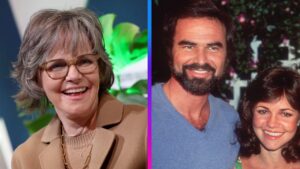
Sally’s warmth wasn’t reserved for co-stars and crew. On the set of “Mrs. Doubtfire” (1993), she formed a close bond with Robin Williams, whose improvisational humor kept everyone on their toes. While Williams often veered wildly off-script, Sally matched his energy, bringing her own blend of quick wit and emotional grounding to their scenes. One day, during a particularly chaotic shoot, Robin began an improvised monologue that had the entire cast in hysterics. Rather than breaking character, Sally responded with equal fervor, turning the scene into a comedic masterpiece. The resulting chemistry between them added layers of authenticity to their portrayal of a family navigating heartbreak and humor, making the film a timeless favorite.
Sally’s connection with her audience extends beyond the screen. In 2018, during a book tour for her memoir “In Pieces,” she met with fans across the country, offering not just autographs but genuine moments of connection. At one event, a woman battling terminal cancer shared how Sally’s films had provided comfort during her darkest days. Sally listened intently, her eyes welling with tears, and thanked the woman for sharing her story. She spoke about the healing power of storytelling and how the woman’s strength inspired her in return. Those present described the interaction as profoundly moving, a reminder of Sally’s ability to make every individual feel seen and valued.
What sets Sally Field apart is not just her extraordinary talent but the humanity she brings to every encounter. Whether she’s delivering an Oscar-winning performance, comforting a struggling crew member, or offering hope to a fan, her actions speak to a deep-seated empathy that resonates far beyond the silver screen. Sally Field reminds us that true greatness lies not just in what we achieve but in how we treat those around us.




